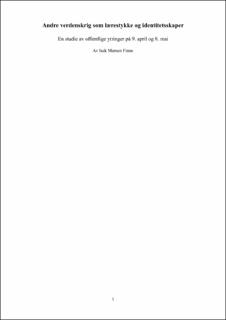Andre verdenskrig som lærestykke og identitetsskaper. En studie av offentlige ytringer på 9. april og 8. mai
Master thesis
Permanent lenke
https://hdl.handle.net/11250/2835154Utgivelsesdato
2021-11-23Metadata
Vis full innførselSamlinger
- Master theses [240]
Sammendrag
This is a study of how the second world war is commemorated on April 9th and May 8th , which is the date that Norway was invaded by Nazi-Germany and the date that Nazi-Germany capitulated and Norway was liberated, respectively. By analyzing speeches and editorials that has been held and printed on these days during a period beginning ten years after the war and lasting until the present age, the objective has been to find how the war-experience and what it symbolizes has changed with shifting historical circumstances. A second main objective has been to investigate how the political and ideological affiliations of the newspapers guides their perception of the war, and how it translates in their use of the war-experience in arguments concerning present day issues. The inquiry focuses on three periods – the first being from 1950 to 1965 during the middle of the cold war and the golden age of social democracy. The second period is from 1980 to 1995, spanning what is sometimes referred to as the “second cold war” and the end of the cold war, when political circumstances in a lot of important ways had shifted distinctly from the first period but also within the same period. The last period covers the years 2015 and 2020, when the commemoration of the liberation has been conjoined with the celebration of all Norwegian veterans who has participated in foreign zones of war and conflict since the end of the second world war.
